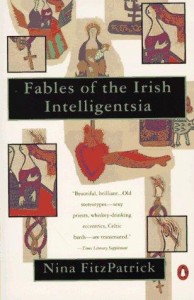Burgess’s fictional afterlives, part four
-
Burgess Foundation
- 11th November 2011
-
category
- Blog Posts
In his 2002 biography of Anthony Burgess, the critic Roger Lewis suggests that Kingsley Amis ‘has fun with’ fictionalising Burgess in his 1988 novel Difficulties With Girls. A poet, Iain Gowrie Guthrie, attends a cocktail party at a publishing house where he boorishly criticises other poets and berates them for not giving his own work sufficiently glowing reviews. To Lewis, this cameo is a version of Burgess ‘whose chief characteristic is his social ineptitude.’
This attribution does not ring completely true. Guthrie is described as a short, single, bearded, long-haired Australian with a mockney accent who attended Oxford University and is a renowned poet, whereas Burgess was a tall, short-haired, clean-shaven, married Englishman with a Mancunian accent who went to university in Manchester and was a renowned novelist. The only thing they have in common is a flat in Rome. It is hard to see the similarities that Roger Lewis assumes are self-evident.
 A much more plausible Burgess appears in the cult short story collection Fables of the Irish Intelligentsia by Nina Fitzpatrick, the bawdy pseudonym for the writing partnership of Galway university lecturer Pat Sheeran and his girlfriend Nina Witoszek, a Polish academic and writer. Their collection of stories, comic in the hallucinatory style of Flann O’Brien, was a cause celebre in Ireland in 1990 when it was nominated for the Irish Times Literature Prize for Fiction, only to be disallowed when it was discovered that the author was not (entirely) Irish. The earthy, witty, short stories in Fables of the Irish Intelligentsia poke fun at Irish intellectualism and the academy, and have attained a cult status in Irish literature following Sheeran’s early death.
A much more plausible Burgess appears in the cult short story collection Fables of the Irish Intelligentsia by Nina Fitzpatrick, the bawdy pseudonym for the writing partnership of Galway university lecturer Pat Sheeran and his girlfriend Nina Witoszek, a Polish academic and writer. Their collection of stories, comic in the hallucinatory style of Flann O’Brien, was a cause celebre in Ireland in 1990 when it was nominated for the Irish Times Literature Prize for Fiction, only to be disallowed when it was discovered that the author was not (entirely) Irish. The earthy, witty, short stories in Fables of the Irish Intelligentsia poke fun at Irish intellectualism and the academy, and have attained a cult status in Irish literature following Sheeran’s early death.
Given Burgess’s attachment to both James Joyce and Ireland, it was perhaps inevitable that he would receive a cameo role in one of the stories, ‘The Man Who Ate the Universe’:
‘I went to the Joyce Week, I met Anthony Burgess in Dawson Street and I asked him if he was afraid of death. I could see in him a fellow Catholic approaching me. I could see that he knew what I meant, that I wasn’t joking.
‘I’m terrified, terrified,’ he said. ‘Dreadfully, dreadfully afraid. Do you know Graham Greene? Greene is terrified himself. That’s why he wanted someone to shoot him in Haiti or wherever it was. That’s why he is tempting all those South American gangsters. He actually feels that if someone kills him, he’ll be saved.’
That’s what Burgess said. Those were his very words.’
This comic cameo of a Catholic Burgess posing as a lapsed intellectual, but secretly terrified of dying and yet still envious of (and sniping at) Graham Greene is a joke one suspects Burgess himself, a master of comic fiction, would have approved.


